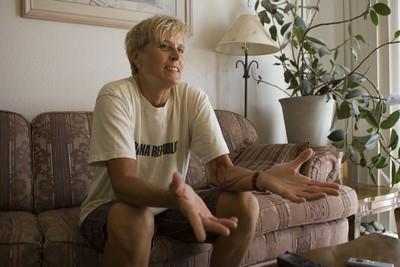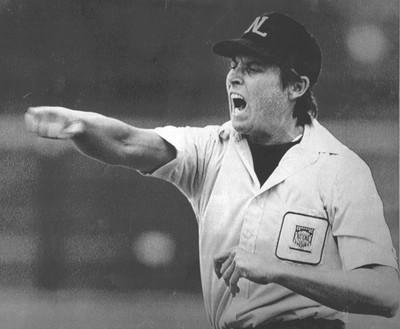Postema still calls ’em like she sees ’em


There is no resentment oozing from the walls inside the modest single-story home in Henderson. There are no visible signs of regret. Those emotions dissipated over time for Pam Postema, who refuses to continue bemoaning a chapter whose ending was written years ago.
She is too busy finding herself.
"I’m 53 and still searching," she said. "Yeah, I know that sounds bizarre. But it’s how I live now. I don’t care about yesterday or tomorrow. I need to discover new things about myself today. You never know how much time you have left."
Do you remember the name? Can you see the Sports Illustrated cover? It has been awhile.
Postema spent 13 years trying to become major league baseball’s first female umpire, the final seven in Triple A before the game decided either she wasn’t good enough (possible) or it wasn’t progressive enough (definitely) to promote her. She was released in 1989.
But time has this way of soothing those who once felt cheated, of altering the perspective of a woman who settled a sexual-discrimination lawsuit out of court and whose book, "You’ve Got to Have Balls to Make It in This League: My Life As an Umpire," exposed what she thought were countless prejudicial barriers within baseball that obstructed her journey to the majors.
She doesn’t seem all that bothered about it now. It has been awhile.
Postema has always been this sort of free spirit seeking new adventure. She spent winters away from baseball working for UPS in Las Vegas and Arizona. She worked on sewer lines and transported skiers up mountains in Steamboat, Colo. She worked in a factory back home in Ohio, where she moved in 1995 to care for her parents, divorced and both ailing.
Her father suffered from Alzheimer’s disease and passed away in 2002. Her mother died in June from heart failure, seven months after she and Pam moved to Henderson.
Maybe it would have been different had she rallied the women’s movement in her favor back when she called balls and strikes, had there been a Martha Burk or others picketing in front of ballparks and demanding Postema be given the opportunity to work major league games. Maybe she should have been more proactive in that sense.
Maybe she just didn’t have the skill to make it.
"Maybe I would have hated it had I made it, hated life in the spotlight where every call would have been scrutinized," she said. "I blame myself now for not making it. There were times I looked in (the mirror) and thought I was the greatest umpire in the world. And times I thought I wasn’t good enough to work a Little League game. I had some lousy games, like everyone.
"It was great fun. Good times and bad. That’s all. I don’t think about it anymore. More and more, I love my life now, who I am today. I can’t say that I came around at the wrong time, that I would have a better chance of making it now. What happened, happened."
This is her life now: Postema is single and recently has worked as a developmental support technician in a facility for mentally disabled adults, but this week she begins training to become a mail carrier. She won’t have much trouble lugging around a heavy bag, given she still runs to keep fit and is unquestionably in better shape than most (if not all) major league umpires.
She doesn’t watch much baseball, not even to keep up with her beloved Cleveland Indians. That’s where her love for the game was born, back in Willard, Ohio, a young girl playing softball and pickup baseball with her brothers.
She worked minor league games of Barry Bonds and Mark McGwire and Jose Canseco, of those prominent names that have since helped fashion the game’s steroids era. She never had a problem with any of them. They all treated her with respect.
Her issues were with smaller players, more in stature than ability.
"For some reason, all the little guys seemed to have that complex and couldn’t get along with me," Postema said. "I always had trouble with the short ones."
Anyone else?
"John Kruk. I threw him out a lot. We didn’t like each other."
Anyone else?
"Larry Bowa when he managed the Las Vegas Stars. Oh, my God, we had some battles. What is he doing now?"
Third-base coach. New York Yankees.
"The Yankees," she said laughing, "how perfect for him."
It’s 2007, and there is every reason to believe a woman will be the Democratic presidential nominee next year. The NBA has employed at least one woman referee since 1997. Women doctors save lives daily. Women fight fires and fly jets and write laws and sit on the nation’s highest court.
And still, in its typically archaic manner, baseball hasn’t discovered a female umpire it believes competent enough for major league promotion. Ria Cortesio still has a chance, given she is the only woman working the game’s professional level today.
The total number of females ever to work a pro game: five.
"Someone will make it, absolutely," Postema said. "Even though baseball is probably still stuck in the 1960s in a lot of ways, someone will get there. And whoever she is will have really earned it.
"I never wanted to umpire for the publicity or to be the first woman to make it. I just wanted to make it. I hate losing at anything. I’m a bad loser. The more they told me I couldn’t do it, the more I said, ‘Hey, this is all me.’
"I just figured that if I kept improving and not making the same mistakes, I would keep going up and up. Then I realized there was a glass ceiling for me. … I don’t think about baseball much any more. It’s just not that big a deal to me."
It has been awhile.
Ed Graney’s column is published Wednesday, Thursday, Saturday and Sunday. He can be reached at 383-4618 or egraney@reviewjournal.com.
ED GRANEYMORE COLUMNS

















